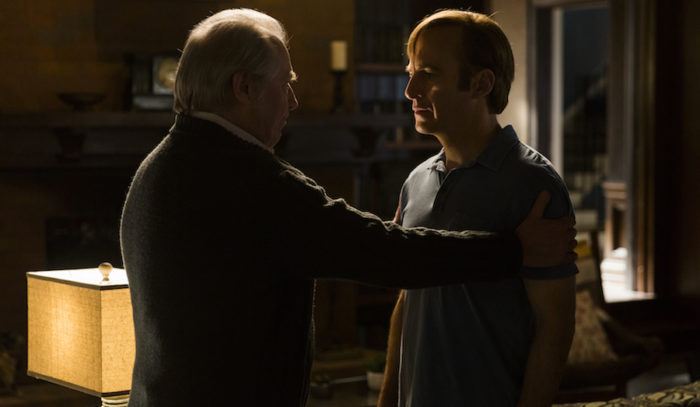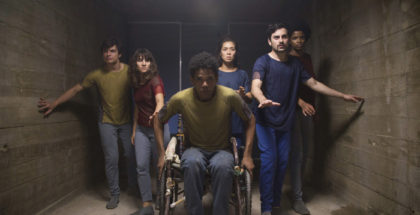Netflix UK TV review: Better Call Saul Season 3, Episode 10 (Finale – Lantern)
Review Overview
Light
8Tunnel
7End
9David Farnor | On 25, Jun 2017
Warning: This contains spoilers. Not seen Better Call Saul Season 3? Catch up with our spoiler-free review of Episode 1 here.
Back when Better Call Saul was first announced, it was expected to be a jolly affair, a comedic romp through the misadventures of a loveable crook. Season 3, though, confirms the Breaking Bad spin-off to be just as dark as its predecessor. Light at the end of the tunnel? No chance.
It’s with no end of cruel irony, then, that Season 3’s finale begins and ends on a shot of a lantern from Jimmy’s childhood, as he and older brother Chuck read a bedtime story together. The show has increasingly become driven by the souring of their bond – one that, after a shaky first season, made a lot more sense once Chuck was revealed to be Jimmy’s enemy. There was brotherly love, yes, but it was unrequited.
This third season placed the duo on a direct collision course, building up to that devastating, gripping courtroom scene in Episode 5. The second half of the season has struggled to live up to that level of precise intensity, but there’s been no doubt that it was a turning point for the pair, prising them apart irrevocably; Chuck, now consumed with more rage than ever, and Jimmy, no longer caring about who he hurts to get what he deserves. If you thought that his transformation into Saul Goodman was complete, though, Season 3 reminds us that this remains a slow descent into Albuquerque’s underworld, and Jimmy’s moral compass is still spinning around unpredictably.
And so, as Episode 10 arrives, we see him begin to regret what’s happened to Irene: after his painstaking manipulation of her and her friends fails to get Irene to accept the Sandpiper settlement offer (giving Jimmy his million-dollar windfall), he tries to make amends, but every time he tries to defend her, it only makes her friends like him more; the charisma and false image of honesty that has normally been such a weapon for Jimmy is now working against him. It’s just a question, now, of when he’ll stop trying to oppose it and just go with it.
Jean Effron deserves a whole heap of credit as Irene, making her character not just likeable and sympathetic throughout Season 3, but also notably dejected and sad at its close, as her life falls apart just enough to make it miserable. Bob Odenkirk, meanwhile, continues to amaze, finding fresh nuances and new quirks beneath his poker-face surface, that facade crumbling every now and then to reveal the conscience still (barely) functioning inside. It’s a treat to see him use those same conman skills to do the right thing one more (last?) time, as he contacts Erin (remember her?) from Davis & Main and gets her to confront him in the middle of a chair-yoga class – stepping outside, but leaving his yoga leader’s microphone switched on (accidentally on purpose), he admits that he played them all for his own financial gain, putting Irene back on the other residents’ good side. It not only turns all the pensioners against him, but also means that his career in elder law is also forever doomed – it’s a short-term sacrifice that will have huge costs in the long-term, effectively ending any realistic chance he has of a straight law career.
As he bids goodbye to that life path, Kim (Rhea Seehorn) also says farewell to the course she had planned: after the shocking car crash that closed out the penultimate chapter, Kim takes a step back from her work-intensive life, passing on the Gatwood Oil case and the Mesa Verde work to someone else to make way for… DVDs. Yes, she heads straight to the nearest Blockbuster (a lovely period detail in a show that airs on Netflix in the UK) and rents a pile of movies to binge-watch on the sofa. Seehorn is superb, her bruised face visibly scarred with the trauma of realising that she’s been overworking herself – and so it’s only natural that she and Jimmy agree to finally call time on their shared office. Because why work yourself to the bone when you can watch To Kill a Mockingbird on DVD?
Jimmy, bless his wardrobe of colourful ties and shirts, still wants her to look at him the way she looks at Atticus Finch, her childhood hero – and role model – but we know now that their relationship, like Jimmy and Chuck’s, is undoubtedly on diverging rails; after two seasons of speculating how it would happen, ties are increasingly being severed to pave the way for the lone wolf of Saul Goodman waiting in the wings. The only comfort is that, where once it seemed Kim was destined to be fridged, her departure may be less violent and more bittersweet than expected.
The closest we get to Breaking Bad, though, is Hector Salamanca, who has a decisive showdown with Gus Fring. Hector, we already know, is not a nice piece of work; we see him swagger into Nacho’s family shop with an arrogant sneer, bribing his dad into agreeing to let Don Hector use it as a front for drug shipping. But Nacho is hoping to stop that ever happening with his pill-swapping prank – and it’s later, after Hector has said he doesn’t trust Nacho’s father, that the effects of that switch finally kick in. Confronted by Gus in a nighttime car park, who tells him that there’s no more arguing – all of Don Eladio’s merchandise will ship through Gus and his chicken shop vans – Hector gets so angry he has a heart attack, prompting Gus to give a knowing look at Nacho, who is careful to sweep away any incriminating fake pills. It’s a sign that Gus and Nacho are destined to become more closely involved, but with Hector whisked away to hospital, potentially losing the use of his limbs in the process, it’s a demonstration of just how near we are to Better Call Saul’s conclusion. It’s hard to see the show lasting longer than one more season, maybe two at most.
That becomes strikingly obvious in the wrapping up of Chuck’s storyline. Following up on his threat to sue Hamlin, Hamlin and McGill, Chuck and Howard have a heated conversation, one that puts Chuck’s arrogance and presumption on full display – as well as his petty vengefulness. Howard, though, takess the moral high ground, agreeing to buy out Chuck’s share in the company for $8 million. Using some of his own money to make the payment, Chuck is shocked to find his bluff called by his fomer mentee – and Howard correctly, cruelly and calmly steers him straight out of the building, delivering a quick speech and leading a company-wide ovation as he walks out of the lobby.
It’s enough to push Chuck back down the healthy ladder – but his pride won’t let him admit it. When McGill the younger knocks on his door and demands to see he’s OK, Chuck hits his brother back with the coldest line of dailogue in the show to date. “I don’t want to hurt your feelings, but the truth is you’ve never mattered all that much to me,” he says, bluntly, then closes the door.
Mike McKean has been immense as Chuck all these years, bringing a dimension to Saul Goodman’s prequel story that was unexpected and could easily not have existed – you suspect McKean’s self-important performance played a key part in the show’s tranformation from a comedy to a tragedy. His attention to detail is more evident than ever here, as he delivers a consummately physical turn in an almost wordless sequence that sees Chuck spiral into panic and desperation, determined to eradicat any last shred of electricity from his house. Running for nearly 10 minutes, the montage of painstaking, methodical madness is mesmeresing stuff – a perfectly unhinged counterpoint to the quiet, logical montage of Mike carrying out his plans in the season’s opening episode. By the end, he’s left in a demolished room, kicking that lantern from the prologue slowly off his nearby desk – an act that, in itself, takes persistent, concentrated effort.
The final glimpse of his property catching light is the boldest cliffhanger the show has delivered yet – a parting shot that places us far from the romp that Better Call Saul once might have been. There are still some miles to go, but Season 3’s climax delivers a major turning point in a season full of major turning points; Saul hasn’t arrived yet, but Chuck has departed. Chuck’s presumed death is less moving in itself – he’s always been most engaging as a foil for Jimmy – but what it will do to Jimmy is a gut-punching thing to consider. This, after all, is a show all about consequences and pay-offs, not about twists or tricks. Chuck’s death is a shock, but the real shock is what it means for the future. Because there’s no way to reverse a decision or undo damage in Vince Gilligan and Peter Gould’s universe. If there is a light at the end of the tunnel, it’s only one that will burn the proverbial house down.
Better Call Saul Season 1 to 3 are available on Netflix UK, as part of an £9.99 monthly subscription.




















